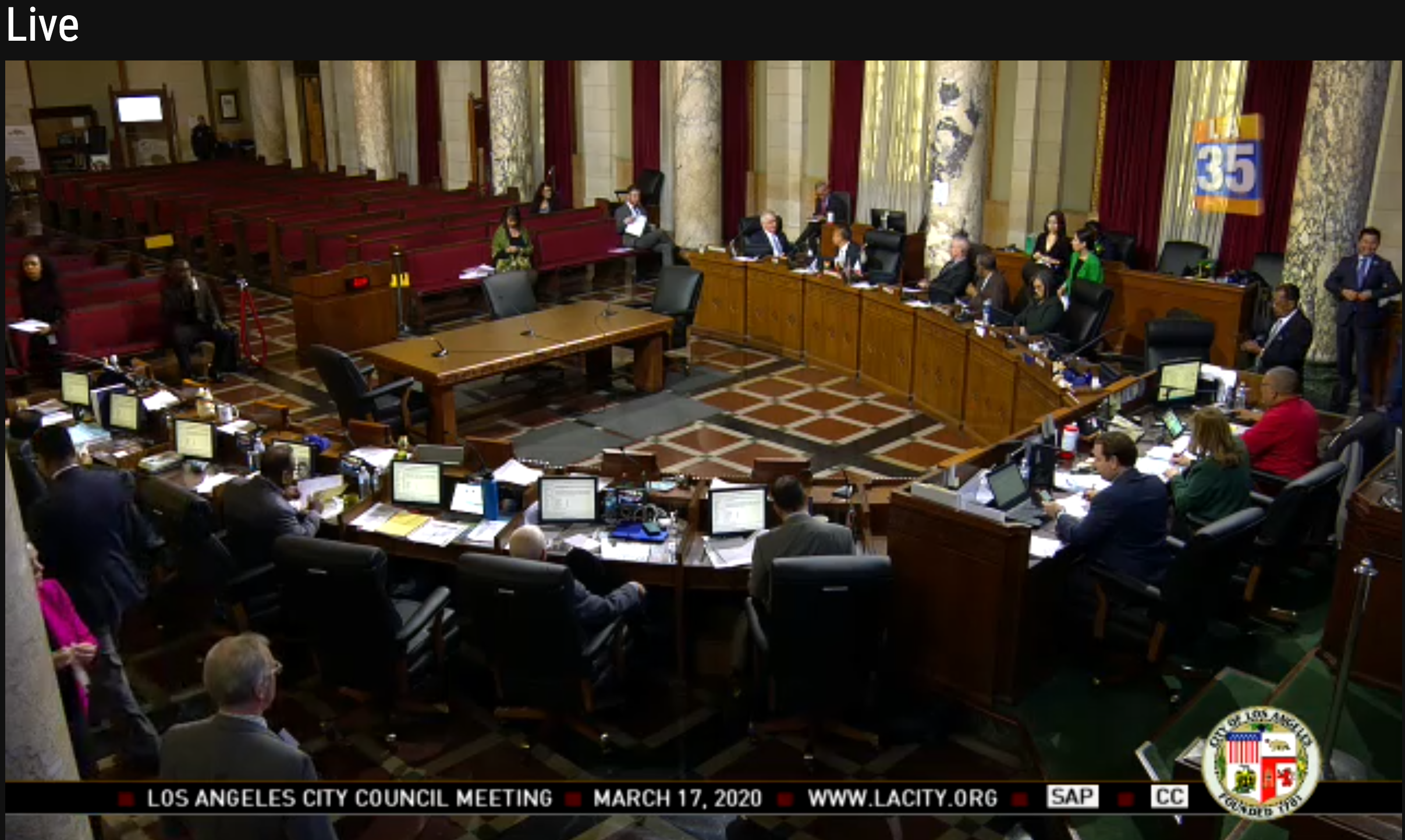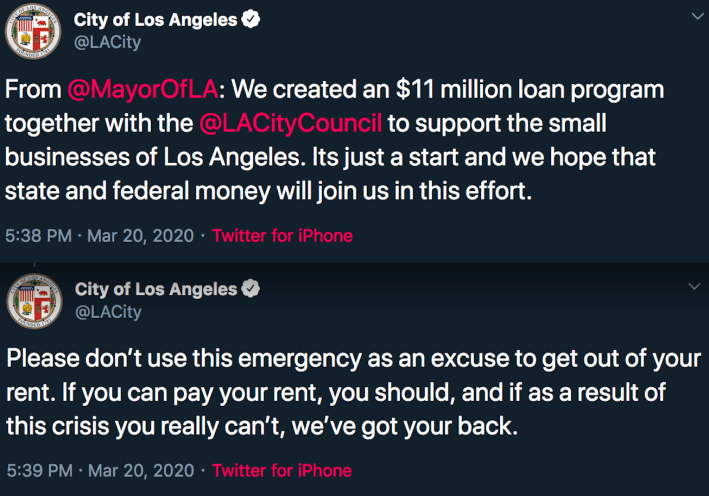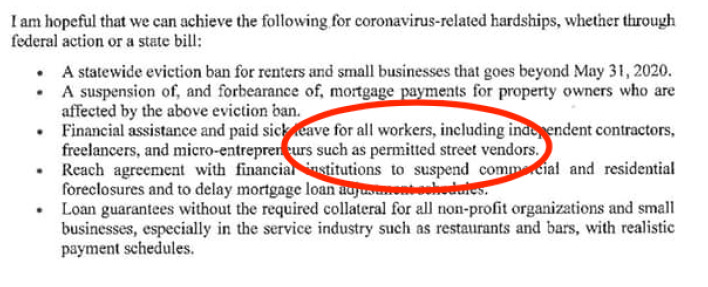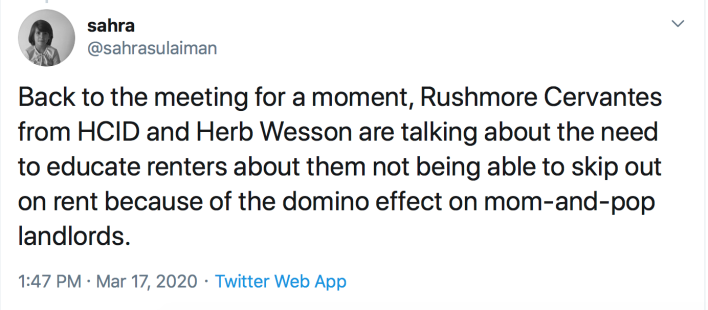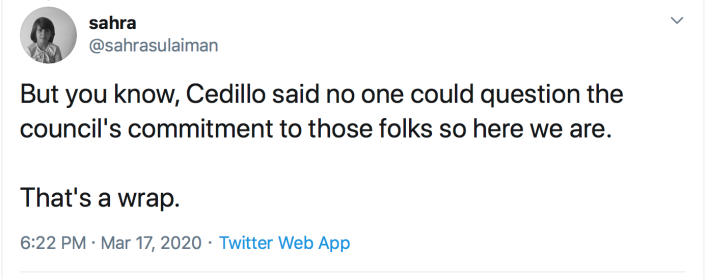While arguing to limit the grace period tenants would have to pay back any missed rent to six months during the marathon city council session last Tuesday, March 17, Second District councilmember Paul Krekorian beseeched his colleagues to consider the Hippocratic Oath - the pledge physicians make to do no harm - and not enact policies that could have far-reaching negative consequences... for landlords.
Although the proceedings had been going on for almost seven hours at that point and seen nearly 50 emergency motions introduced, a do-no-harm-to-landlords plea still managed to stand out from the fray.
It was the day's most egregious reminder of how poor council's - and the city's - track record has historically been on centering the needs of L.A.'s deeply rent-burdened and housing insecure populations.
It also would not be the last such reminder. Just three days later, the City of L.A.’s official twitter account would tout the creation of an $11 million loan program to assist small businesses on behalf of Mayor Eric Garcetti’s office, and follow it up with its own version of Krekorian’s oath. That the second tweet implied the economic shut-down wouldn’t be much of a burden to most Angelenos anyways was the icing on the cake. [That tweet was later deleted after being roundly blasted.]
Of course, the question council should be contemplating when it finally attempts to reconvene Friday morning is not one of doing no harm to landlords. Or to anyone else for that matter.
We have tens of thousands of Angelenos living on the street at the moment, nearly half of whom are Black, despite the fact that Black people only comprise about eight percent of the county’s total population. Hundreds of thousands more of our neighbors - mostly those from lower-income immigrant communities, the undocumented, the underpaid and underemployed in the informal sector, and/or those subsisting on the margins in historically disenfranchised communities - are severely rent-burdened, living in substandard conditions and paying between 50 and 90 percent of their income in rent.
Harm is rooted in this city’s DNA.
The question at hand is whether city leadership is prepared to act in ways that stop perpetuating the harms that segregation built into the system.

[A mapping of rent-burdened Angelenos by the Neighborhood Data for Social Change platform - a project of USC's Price Center for Social Innovation - shows the greatest concentration of rent-burdened populations tend to live in formerly redlined areas. "Rent-burdened" refers to those paying 30-50 percent of income in rent; "severely rent burdened" means paying 50 percent or more of your income in rent.]
Unfortunately, what we saw at council last Tuesday was not promising in that regard.
In adhering to the do-no-harm-to-landlords doctrine, council both reaffirmed its refusal to engage the structural barriers responsible for leaving so many of our neighbors behind and ensured those barriers would be woven into the safety net it was hastily knitting together.
Some of those barriers were perpetuated as a matter of course, as seen in David Ryu’s proposal to set aside $1,000,000 for those needing emergency assistance with residential or business rents in his district. While the decision to channel the funds through the Jewish Free Loan Association was likely made because council itself doesn’t have the capacity to manage a microloan and grant program, the fact that JFLA asks applicants to provide a social security number means some of his neediest constituents could be refused help.
At other moments, like during the discussion of the moratorium on street vending, the perpetuation of barriers appeared far more calculated.
It didn’t help that Seventh District councilmember Monica Rodríguez had introduced her motion with the declaration that, by attracting crowds, street vendors constituted "an immense public hazard" and a threat to other vulnerable people. She would later amend her remarks to clarify she did not mean to enact a full moratorium, but rather to have health protocols and permit compliance stringently enforced (as seen in the substitute motion below; see the full document here).
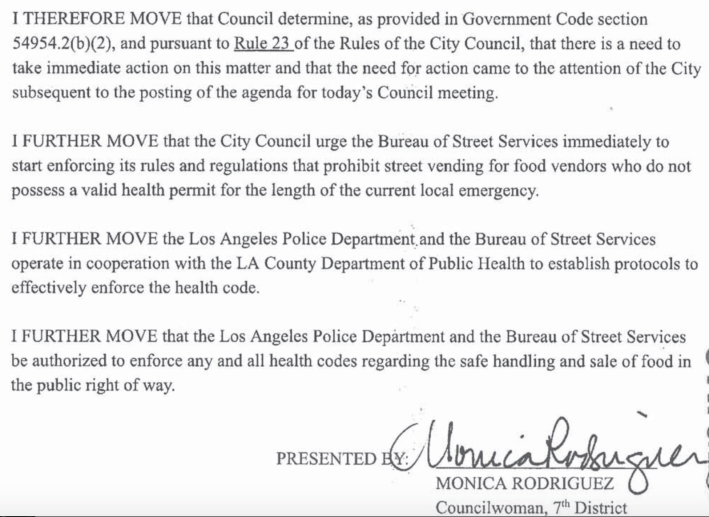
But councilmembers voting on the motion knew it would effectively constitute a moratorium in practice, both during the emergency period and long after that period had passed.
Or, at least, they should have known it.
Out of the thousands of food vendors that work L.A.’s streets daily, only 29 have managed to successfully navigate the fledgling health permitting process thus far.
A lengthy letter sent to city council last month by the Los Angeles Street Vendor Campaign (LASVC) had detailed just how many barriers to permit access had been built into the system and warned that requiring compliance with such a system could keep vendors from being able to practice their trade. Not only had the rollout, administration, and enforcement of the program been inadequate, haphazard, confusing, and punitive the letter explained, the permitting process itself was prohibitively costly, required equipment that was unavailable (or inaccessible) to vendors, and hadn't been adapted to reflect how family businesses operated in L.A. (e.g. requiring each person be individually permitted, adding to their cost burden), among many other things.
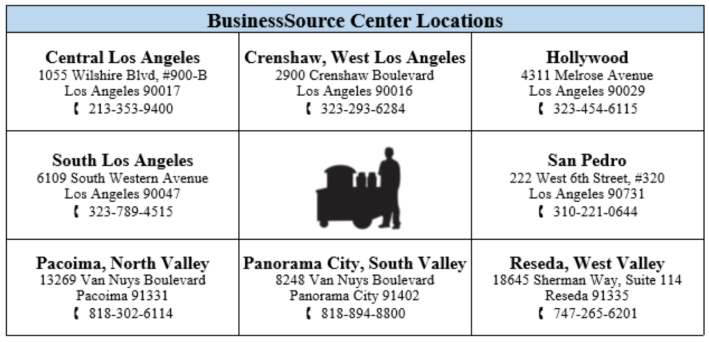
Undeterred by, unaware of, or unconcerned by the dysfunctionality of the permitting process, First District councilmember Gil Cedillo stood to support Rodríguez' call for vendors to adhere to it.
"Our commitment to the undocumented community and immigrant community of this city is well established by this council," he said, recasting council's years of dawdling on a vending ordinance as a point of pride. "This is a city of sanctuary. So no one can challenge or question our commitment, as a city, to the undocumented and the vulnerable."
Talk, as they say, is cheap, however.
Though Rodríguez herself had made a motion directing the Chief Legislative Analyst to report on both economic relief programs available to restaurants and the hospitality industry and the impact of a tax holiday for those businesses earlier in the day, she never raised the possibility of offering assistance to vendors to supplement their loss of income. Nor did anyone else.
And the larger body of vendors were explicitly excluded from the conversation around assistance yet again in a letter Thirteenth District councilmember Mitch O’Farrell sent to Governor Gavin Newsom Wednesday night. O'Farrell, who had previously tried to limit vendors' access to parks by claiming they would overrun those spaces and ruin parkgoers' park experiences, asked for Newsom's assistance in securing paid sick leave and other benefits for non-traditional workers, including “permitted street vendors.”
Vendors provide an essential service to low-income residents, particularly those with limited access to transportation or easy access to fresh fruits, vegetables, or affordable meals. They also represent some of the most rent-burdened Angelenos, averaging around $200 a week in earnings, or just over $10,000 a year, according to the UCLA Street Vendor Project. And as they are the least likely to be able to access any loan programs, grants, or other assistance offered by the city, state, or federal government during this emergency, they are among the people most at-risk for immediately falling into crisis.
If council can’t spare a thought for their plight during the discussion of a motion specifically aimed at curtailing their ability to make a living, what hope is there for less visible groups on the margins to get the attention and assistance they need?
Not a whole lot, dear Reader.
Not a whole lot.
We know that because, an hour earlier, when the opportunity had arisen for council to uplift those groups via the eviction moratorium Eleventh District councilmember Mike Bonin introduced, council had balked.
In moving that the council extend to 24 months the grace period to pay back late rent beyond the six Mayor Eric Garcetti had originally set out in his executive order, Bonin had cited the looming catastrophe as a reason to take bolder steps. Like not requiring a tenant show documentation of the impact coronavirus had had on their income. [See the motion here.]
"There is not a person in Los Angeles who will not be impacted by the coronavirus," he explained. So tying the eviction moratorium to non-payment of rent, as Krekorian and O'Farrell would eventually require via their amendment to his motion, would only making accessing assistance harder. And it could encourage unscrupulous landlords to find other justifications for kicking poor tenants out - something that has long been a pressing issue in gentrifying neighborhoods.
"When we're talking about families who are already paying 90 percent of their income - 90 percent of their income - [on rent, and there are] hundreds of thousands of people in Los Angeles in that predicament..." he said, "they're not going to be able to pay this back quickly."
Or at all.
"We want to be mindful of the fact that evicting somebody now means they're gonna be homeless," Bonin reiterated at one point. "The secondary goal of this body has got to be to prevent more people living in tents in our streets."
It was a rather basic ask, all things considered. A wide-ranging set of organizations comprising the newly formed Healthy L.A. Coalition had called for rent freezes and rent forgiveness - proposals which received only dismissive passing mention by councilmembers.
Krekorian, however, would not be moved.
Though he grudgingly acknowledged that some tenants would likely never be able to pay back missed rent, he was adamant that giving tenants too much leeway could set a lot of harmful consequences in motion, most notably by shifting the burden of loss to landlords.
With two years (per Bonin's proposal) to pay back missed rent, he warned, tenants could get out of paying rent altogether if they moved or their lease expired first.
While larger landlords could absorb that kind of drop in revenue, he argued, many mom-and-pop landlords - a category of which Krekorian (and a number of the other councilmembers) is a member - could not.
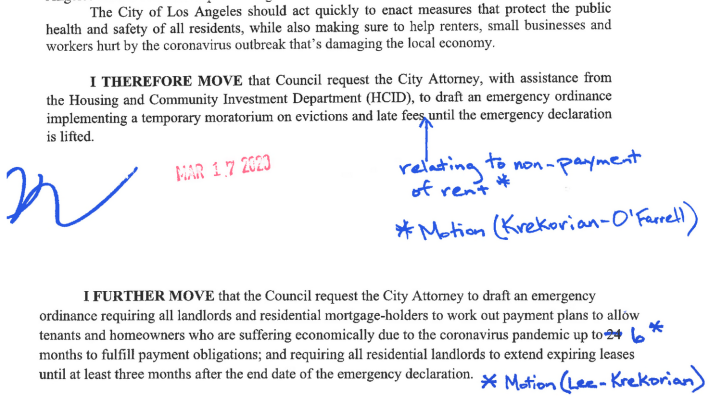
Tenth District councilmember Herb Wesson - also a landlord - concurred.
While speed was of the essence, Wesson said, it was also important to take a "time-out" to chat with mom-and-pop landlords and hear about their ideas. Given that "so many people" have banked their retirement on the investment made in an eight- or twelve-unit apartment building, he continued, council shouldn't take any drastic steps without having all the stakeholders at the table.
Of course, as a representative of South L.A., Wesson would know better than most that the mom-and-pop landscape changed drastically after the 2008 subprime mortgage crisis. Foreclosures hit South L.A. and the Eastside particularly hard, stripping many Black and brown homeowners (and landlords) that had been explicitly targeted by predatory lenders of everything they had.
Wesson would also know that, in the intervening years, corporate landlords had found a way to exploit that bonanza. The most visible investor, Blackstone subsidiary Invitation Homes, has snapped up over 3,000 properties in L.A. county alone, including a sizable chunk on the east side of South L.A. Ocean Development, Inc., an investor that converts "dilapidated" structures into multifamily duplexes, buys exclusively south of the 10 Freeway and, in 2017, celebrated the construction of its 1000th home.
Between these larger entities and lower-profile investors quietly snapping up properties here and there, the odds are against true mom-and-pops overlapping with the majority of renters most in need of protection.
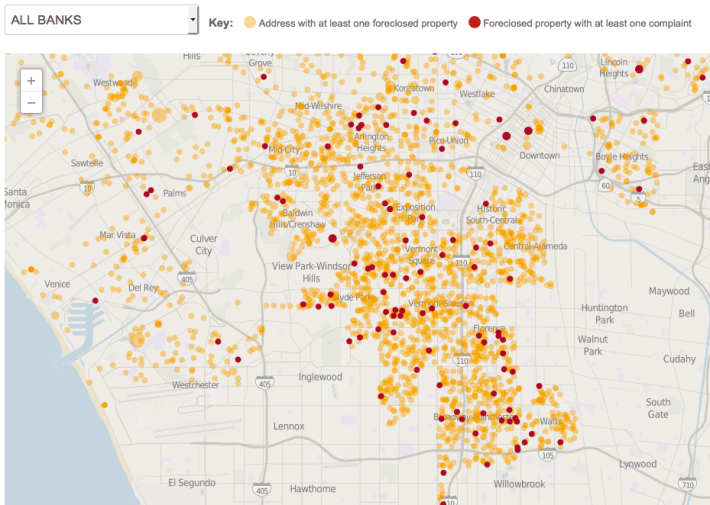
But council would not be dissuaded.
Rodríguez spoke in favor of the shorter grace period as did Twelfth District councilmember John Lee. The embattled Lee, better known to those following the FBI investigation into the corrupt dealings of his boss, former councilmember Mitch Englander, as a possible city staffer of interest, asked if it was even legal to interfere with the contracts between tenants and mom-and-pop landlords. And Cedillo, whose district includes Pico-Union and Westlake - two low-income vendor-heavy neighborhoods that rank among the most overcrowded in the country - thanked his colleagues for their "sage" perspectives and withdrew his second of Bonin's motion.
The Krekocratic Oath had prevailed: No harm had been done to landlords.
Structural harms, on the other hand, had definitely been perpetuated.
As council belatedly heads to chambers later this (Friday) morning, the landscape looks much bleaker than it did just a week and a half ago. Non-essential businesses have been told to shut down, parks have been closed to the public, those that can have been advised to shelter at home, and the unemployment rate has boarded a SpaceX shuttle headed to Mars.
The fixes will therefore need to be that much grander, making the potential for deepening existing inequities that much greater, should a do-no-harm-to-landlords-type approach to triage continue to prevail.
It cannot prevail.
With tens of thousands unhoused on our streets and hundreds of thousands more tottering on the edge of homelessness, L.A. cannot afford to emerge from quarantine less intact, less inclusive, less resilient, or less just.
Council has an opportunity today to begin to break with the way city business is usually conducted. Here's hoping it finds the courage to do so.
_______
Want to follow along with today's council proceedings? Find the agenda here. Watch the meeting live here. See the list of demands made by the HealthyLA Coalition here. Find last week's meeting here.
